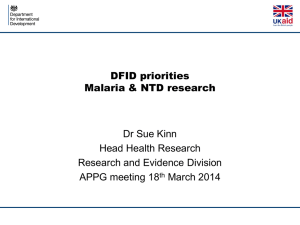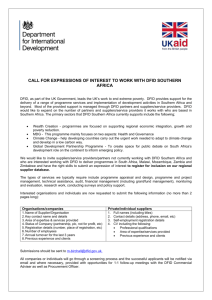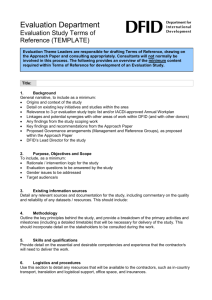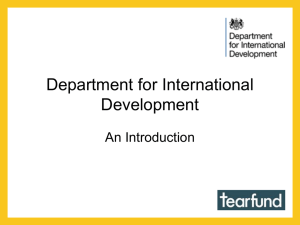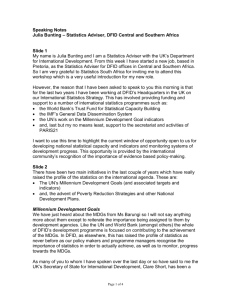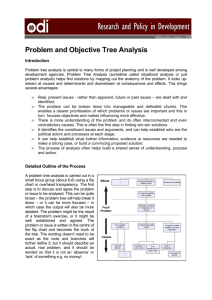Business Case - Department for International Development
advertisement
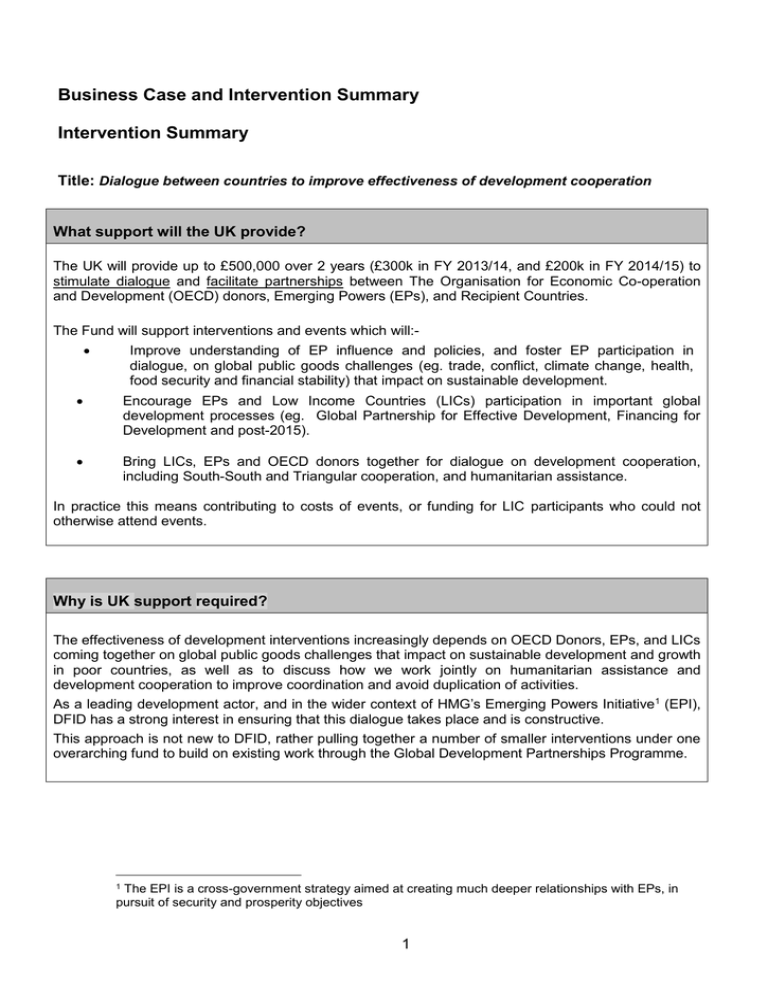
Business Case and Intervention Summary Intervention Summary Title: Dialogue between countries to improve effectiveness of development cooperation What support will the UK provide? The UK will provide up to £500,000 over 2 years (£300k in FY 2013/14, and £200k in FY 2014/15) to stimulate dialogue and facilitate partnerships between The Organisation for Economic Co-operation and Development (OECD) donors, Emerging Powers (EPs), and Recipient Countries. The Fund will support interventions and events which will: Improve understanding of EP influence and policies, and foster EP participation in dialogue, on global public goods challenges (eg. trade, conflict, climate change, health, food security and financial stability) that impact on sustainable development. Encourage EPs and Low Income Countries (LICs) participation in important global development processes (eg. Global Partnership for Effective Development, Financing for Development and post-2015). Bring LICs, EPs and OECD donors together for dialogue on development cooperation, including South-South and Triangular cooperation, and humanitarian assistance. In practice this means contributing to costs of events, or funding for LIC participants who could not otherwise attend events. Why is UK support required? The effectiveness of development interventions increasingly depends on OECD Donors, EPs, and LICs coming together on global public goods challenges that impact on sustainable development and growth in poor countries, as well as to discuss how we work jointly on humanitarian assistance and development cooperation to improve coordination and avoid duplication of activities. As a leading development actor, and in the wider context of HMG’s Emerging Powers Initiative1 (EPI), DFID has a strong interest in ensuring that this dialogue takes place and is constructive. This approach is not new to DFID, rather pulling together a number of smaller interventions under one overarching fund to build on existing work through the Global Development Partnerships Programme. 1 The EPI is a cross-government strategy aimed at creating much deeper relationships with EPs, in pursuit of security and prosperity objectives 1 What are the expected results? The Fund will increase opportunities for dialogue on global public goods and development cooperation between recipient countries, EPs and OECD donors, facilitating better understanding of the impact of EP policies on poor countries, knowledge sharing and better coordinated development assistance. This will increase the likelihood of an improved international commitment to, and effective implementation of, policies and programmes of development cooperation that reflect the priorities of poor countries. While evidence that this intervention will achieve the desired impact will be limited (it is not possible to accurately measure the impact of the Fund due to the difficulty in establishing attribution and because of the inherently complex nature of the partnerships and outcomes involved), we consider postdialogue reporting and evaluation will inform future discussions in the shorter term, and influence policy in the longer term. 2 Business Case Strategic Case A. Context and need for a DFID intervention CONTEXT As the economies of Emerging Powers (EPs) - countries such as China, Brazil, India and South Africa - grow, so too does their influence on world affairs. At the global level EPs are now key players on global public goods challenges that impact on sustainable development (eg. trade, climate change, health, food security and financial stability). The size and future growth of their economies means their impact on poor countries will continue to grow – through trade and investment as well as aid. Crucially, having achieved strong growth in recent years and having succeeded in bringing so many of their own people out of poverty, EPs are well-placed to share their experience with those countries that are still developing. EP development cooperation, trade and investment in countries poorer countries (often called “South-South Cooperation” - SSC) is significant and growing (see Table 1). Table 1: Comparison of BRIC characteristics as donors China India Brazil Aid (USD 1,400-25,000 1,420 356 mn) South Africa 433 0.04 – 0.79 Grants, credit lines, interest free loans and concessional loans Projects, debt cancellation and stipends 0.13 Credits, concessional loans and grants 0.03 ND 0.18 Grants and loans Projects, scholar-ships, debt cancellation, and humanitarian assistance Co-financed projects and technical assistance Co-financed projects and technical assistance Sectors Infrastructure, productive sectors, health, and prestige projects Agriculture, infrastructure and transport Agriculture, education and health Country focus Latin America, Immediate Asia and Africa (44 neighbourhood and percent) Africa Democratisation, post-conflict resolution and humanitarian assistance Africa %/GNI Form Modality Latin America and 15 African countries (Lusophone in particular) Source: ‘Kragelund P.- The potential role of non-traditional donor’s aid in Africa’ ICTSD, 2010. As the volume of EP development cooperation increases, it will be important to reduce the risk of fragmentation and lack of coordination which undermines the positive impact development 3 assistance can have on reducing poverty. To maximize the impact of global development efforts we need to find ways to understand better EPs policies on international development and assistance. One vehicle for this is triangular cooperation where an established OECD donor works with an EP on a development intervention in a third, lower-income country. UK’s Emerging Powers objectives: DFID is working within the wider context of HMG’s cross-government Emerging Powers Initiative (EPI), established in May 2010, aimed at creating much deeper relationships with the emerging powers in pursuit of long term security and prosperity. Global Partnerships Department’s Emerging Powers work has the following objectives: i) To improve the effectiveness and efficiency of development assistance. By sharing lessons we can make EP and UK aid smarter at reducing poverty. UK aid should reflect lessons from EPs’ recent development experience and can catalyse the uptake of relevant lessons in poorer countries. ii) To encourage investment by EPs in poorer countries and regions. Done well, in response to local and regional priorities, EP investment can stimulate growth and drive development. iii) To encourage EPs to play a strong and constructive role in responding to global challenges such as trade, conflict, climate change, health, food security and financial stability. Collaboration on global issues can improve development prospects in poorer countries. iv) To work with EPs to promote a better, more effective international and multilateral system. Cooperating with EPs will be important in multilateral reform, G20 action, the Global Partnership, and shaping the post-MDG framework. In the next few years, our EP engagement will be particularly important for: Generating support for for the UN Secretary-General’s High-Level Panel report and constructively influencing the intergovernmental process around the post-2015 development agenda; Establishing the Global Partnership for Effective Development Cooperation (GPEDC) as a key forum for dialogue on improving development effectiveness; Maintaining global attention on Food Security and Nutrition; Advancing our ambitious agenda on Girls and Women; Laying the ground for Financing for Development discussions. “Middle Powers” engagement We are also increasingly exploring the development of partnerships with countries – recently termed “middle powers” by the FCO - such as Colombia (where we have had a DFID staff member for just over a year), Indonesia (where we have just deployed a DFID staff member), UAE, Turkey, and Mexico. The voices of these countries in key international settings (e.g. UN General Assembly; G20; Global Partnership for Economic Development) would add real value to debates of concern to DFID. The Global Development Partnerships Programme (GDPP) Approved in 2010, the GDPP aims to bring greater coherence to DFID’s relations with Emerging Powers and new donors (e.g. Gulf States) in order to increase their impact on poverty reduction, particularly in low income countries. The GDPP supports proposals which are designed to: Strengthen the impact of global development policies – e.g. shaping global development policy through the G20, global climate change through the UNFCCC, and global trade policy through the WTO. 4 Build knowledge or promote innovative practices for the benefit of low income countries. A large proportion of GDPP funding is channelled through EP country offices for large programmes in partnership with the respective EPs. A reserve is held in Global Partnerships Department to fund activities that sit outside of our partnership work and address our objectives across the EPs. NEED FOR DFID INTERVENTION: It is good that more actors are involved in development, but the world is moving from aid toward increasing dialogue and cooperation. EPs are critical to these processes. Action is needed to bring countries together on global public good challenges that impact on sustainable development, as well as to discuss how we work jointly on humanitarian assistance and development cooperation. To date, there has been little international discussion on the best way to use triangular cooperation. Dialogue between the UK (and other established OECD donors), EPs and Recipient Countries will deepen mutual understanding of development policies and strategies and their impact on growth and poverty reduction in poor countries. It will help to improve the combined impact of all development assistance, and triangular cooperation in particular, in developing countries. As a leading development actor, DFID can help facilitate, encourage and build these conversations. With the GDPP reserve, we have previously funded (during 2013) ad hoc, low cost initiatives facilitating dialogue between recipient countries, EPs and OECD donors in global dialogue, including: £100,000 to enable 20 developing (mainly LIC) countries to participate in the June UN Development Cooperation Forum; and £2,000 to fund Cambodian participation at an OECD Policy Dialogue of Triangular Cooperation (to “build consensus on the necessary elements for triangular cooperation and agree on policy recommendations and actions by the international community to promote more and better triangular cooperation”), which included delegates from China. A £30,000 contribution to the October Wilton Park Conference bringing stakeholders and EPs together for dialogue on humanitarian assistance. We are also exploring a further proposal from Wilton Park for a £60,000-£75,000 contribution to a conference on Financing for Development during 2014. We are also considering a contribution to the 2014 United Nations Development Cooperation Forum (DCF) of £150,000 in FY 13/14 towards analytical work on (i) trends in global development cooperation flows, and (ii) trends in global accountability in Development Cooperation. It is expected that DFID will continue be asked to consider proposals that seek to facilitate OECD, EP and Recipient Country participation in important development processes (including dialogue on global public goods) and development cooperation dialogue. As we develop our collaboration with “middle powers”, we will also consider how their voices can have maximum impact in key international settings. A more proportionate and efficient approach to such requests is to approve this over-arching business case to set up a Fund from the GDPP Reserve for ad hoc interventions that meet at least one of 3 specific criteria. Criteria: the Fund would support interventions and events which will: Improve understanding of EP and “middle power” policies, and foster EP and “middle power” participation in dialogue on global challenges – e.g. trade, conflict, climate change, health, food security and financial stability, and/or Encourage EP, “middle power” and LIC participation in important global development 5 processes such as the UN DCF, the Global Partnership for Effective Development Cooperation, and debates/forums on the post-2015 development financing agenda, and/or Bring LICs, EPs, “middle powers” and OECD donors together for dialogue on development cooperation, including South-South, triangular cooperation and humanitarian assistance. In practice this means contributing to costs of events (such as the Wilton Park Conference), or funding for LIC participants who would not otherwise attend events (such as Cambodian participation at the OECD dialogue on Triangular Cooperation). B. Impact and Outcome that we expect to achieve The expected impact: Through better understanding of the impact of EPs policies on poor countries, sharing knowledge and better coordinating development assistance, this will increase the likelihood of improved international commitment to and coordination of pro-poor policies that reflect the priorities of poor countries. The expected outcome: Increased opportunities for dialogue on global public goods and development cooperation between OECD donors, EPs and recipient countries. 6 Appraisal Case A. What are the feasible options that address the need set out in the Strategic case? Option 1. Create an umbrella fund to support interventions that meet at least one of the 3 criteria set out in the strategic case. Strengths and Benefits: This approach could increase the likelihood of achieving the expected outcome through a more efficient and strategic approach to funding requests, while upholding the underlying principles of our EP work. Previously, when Global Partnerships Department has provided funding for such interventions, an approved business case and ARIES project has been required for each, individual intervention on an ad hoc basis. With the value of each intervention falling between £2,000 - £100,000, a more proportionate and efficient approach is to approve this over-arching business case to set up a Fund from the GDPP Reserve for ad hoc interventions that meet at least one of the 3 specific criteria. Weaknesses: Setting criteria may affect the degree of flexibility for considering such ad-hoc interventions. Option2. Do nothing more than DFID is already doing Strengths and benefits: Managing ad hoc interventions individually allows some degree of flexibility by considering each individual intervention’s objectives which may go beyond pre-agreed criteria. Weaknesses: This approach does not provide objective criteria to judge overall success/impact of small scale GDPP funded interventions. This approach is also likely to result in a disproportionate amount of staff time is spent on low value interventions, and does not represent value for money. B. Assessing the strength of the evidence base for each feasible option including delivery routes Option 1 2 3 Evidence rating Limited Limited Add rows as necessary Options 1 and 2: The effectiveness of development interventions increasingly depends on OECD Donors, EPs, and LICs coming together on global challenges that impact on sustainable development and growth in poor countries, as well as to discuss how we work jointly on humanitarian assistance and development cooperation to improve coordination and avoid duplication of activities. As a leading development actor, and in the wider context of HMG’s Emerging Powers Initiative (EPI), DFID has a strong interest in ensuring that this dialogue takes place and is constructive. The approach set out at Option 1 is not new to DFID, rather pulling together a number of smaller interventions under one overarching fund to build on existing work (Option 2) through the Global Development Partnerships Programme. While evidence that this intervention will achieve the desired impact will be limited (it is not possible to accurately measure the impact of the Fund due to the difficulty in establishing attribution and because of the inherently complex nature of the partmerships and outcomes involved), we consider post-dialogue reporting and evaluation will inform future discussions in the shorter term, and influence policy in the longer term. C. For each feasible option, what is the assessment of local capacity? Is the intervention likely 7 to strengthen capacity in a durable manner? The programme will not deliver a direct impact on LIC capacity. In the medium term, sharing knowledge should strengthen capacity of the donor community to deliver more effective and sustainable development assistance, strengthening capacity of LICs in the long term. D. What is the likely impact (positive and negative) on climate change and environment for each feasible option? Categorise as A, high potential risk / opportunity; B, medium / manageable potential risk / opportunity; C, low / no risk / opportunity; or D, core contribution to a multilateral organisation. Option 1 2 3 Climate change and environment risks Climate change and environment and impacts, Category (A, B, C, D) opportunities, Category (A, B, C, D) C C C C Add rows as necessary E. If any, what are the likely major impacts on social development? The programme will not deliver direct impacts on social development. In the long term, through better understanding of the impact of EPs policies on poor countries, sharing knowledge and better coordinating development assistance, this will increase the likelihood of maximising the impact of development investments on poor people’s lives. F. For fragile and conflict affected countries, what are the likely major impacts on conflict and fragility, if any? The programme will not deliver direct impacts on conflict and fragility. In the long term, dialogue on a coordinated approach could contribute to a reduction in conflict and fragility. G. What are the costs and benefits of each feasible option? Identify the preferred option. Option 1. Costs: Potential for more calls on the Fund than would normally come to GPD. Benefits: More proportionate and efficient use of staff resources by developing and approving one over-arching business case, and setting up one over-arching project on ARIES. Option 2. Do nothing more than DFID is already doing: Costs: Staff resources spent on developing and approving multiple business cases, and setting up multiple projects on ARIES. Benefits: Will not create an expectation of funding from a ready-made fund (eg. where other funding 8 streams may be more appropriate). H. Theory of Change for Preferred Option The Problem identified in the strategic case is that as the volume of EP development cooperation increases, so does the risk of fragmentation and lack of coordination between development actors, which undermines the positive impact development assistance can have on reducing poverty. The desired impact for the programme is that through better understanding of the impact of EPs policies on poor countries, sharing knowledge and better coordinating development assistance, this will increase the likelihood of improved international commitment to and coordination of pro-poor policies (through global processes and trilateral engagement) that reflect the priorities of poor countries. To contribute to this impact, DFID will create an overarching fund to build on existing work to facilitate OECD Donors, EPs, and LICs coming together through the GDPP. This approach could increase the likelihood of achieving the desired impact through a more efficient and strategic approach to ad hoc funding requests – upholding the underlying principles of our EP work by following one set of criteria for ad hoc funding applications to the GDPP. The key assumption is that EPs and Recipient Countries recognise the value of, and are willing to enter into three-way dialogue on development cooperation and global challenges with UK and other OECD donors. Since 2011, and establishment of a new programme to manage the development relationships with Emerging Power countries more effectively, DFID’s development partnerships with China, Brazil, India and South Africa have strengthened – increasing trilateral engagement through our GDPP-funded projects has encouraged better link-up with these countries on international processes (particularly post-2015 and GPEDC) and increases the likelihood of EP engagement with other OECD donors. Evidence that this intervention will achieve the desired impact is limited - it is not possible to accurately measure the impact of the Fund due to the difficulty in establishing attribution and because of the inherently complex nature of the partnerships and outcomes involved. We can, however, measure the success of the Fund at the outcome level – e.g. by seeing an increase in opportunities for dialogue on global public goods and development cooperation between OECD donors, EPs and recipient countries. I. What measures can be used to monitor Value for Money for the intervention? In addition to staff resources, each proposal will be assessed for value for money (VFM) including the proportion of management fees (no more than 15%) and application of DFID travel rules prior to approval of funding. Readout from discussions, along with DFID and officials’ feedback on dialogue will be used by DFID to best quantify the success and value for money on completion of each intervention. J. Summary Value for Money Statement for the preferred option Preferred Option 1 - Putting a monetary value on and assessing the value for money of policy work such as this is difficult, as its impact will be long-term. In the short-term, staff time spent managing interventions using VFM principles, along with readout from discussions, and with DFID and officials’ feedback on dialogue will be used by DFID to best quantify the overall success and value for money of this fund. 9 Commercial Case Delivery through a third party entity (multilateral organisation; civil society organisation or support to government) A. Why is the proposed funding mechanism/form of arrangement the right one for this intervention, with this development partner? Direct one-off payments (under separate Accountable Grant agreements) to reimburse agreed costs will ensure the lowest administrative cost to DFID. B. What assurance has been obtained on capability and capacity to deliver? In practice, we will be contributing to agreed costs for events run by international organisations such as UNDCF and OECD, or organisations that have received DFID funds in the past (such as Wilton Park and Chatham House). Where appropriate, we will seek evidence of capability and capacity to deliver from reviews of previous DFID-funded programmes/projects. By issuing funds under Accountable Grants, there will be scope to both set out direct procurement principles and deliverables that will apply to the DFID Grants. C. Is there an opportunity to negotiate on anticipated costs? For each proposal, a view will be taken on elements of the budget that are appropriate for a contribution against criteria set out in this business case. Financial Case A. Who are the recipients of all proposed payments? Funds will be received by the organisation submitting the funding request. Costs will be broken down to include participant costs, and related administration and overhead costs B. What are the costs to be incurred directly by DFID? Direct costs to DFID will be up-to £500,000 over 2 years (£300k in FY 2013/14, £200k per annum in FY 2014/15) C. What are the costs to be incurred by third party organisations? N/A D. Does the project involve financial aid to governments? If so, please define the arrangements in detail. N/A 10 E. Is the required funding available through current resource allocation or via a bid from contingency? Will it be funded through capital/programme/admin? Required funding is available through current resource allocation (GDPP Programme funds). F. What is the profile of estimated costs? How will you work to ensure accurate forecasting? In practice, the fund would broadly cover contributions to up-to 4 conferences, plus costs for a number of individual participants at appropriate events per annum. For each individual intervention, organisations will provide a detailed breakdown of forecast costs prior to funding approval, and funds will be paid in arrears on receipt of a detailed breakdown of actual expenditure. This approach will ensure accurate forecasting. G. What is the assessment of financial risk and fraud? The assessment of financial risk and fraud is low Organisations will be advised of DFID’s travel policy, and will confirm costs for reimbursement prior to expenditure. Money will be reimbursed in arrears. Mitigating measures: Organisations will be informed of DFID’s zero tolerance approach to corruption and fraud. Flight costs and subsistence rates will be agreed prior to expenditure. Requests for funds will be scrutinised by the by the GPD project manager – ensuring expenditure matches agreed costs - prior to receipting on Aries. H. How will expenditure be monitored, reported and accounted for? Expenditure will be accounted for on receipt of invoice/request for funds from organisations. As one-off payments will be the norm, this will not usually require on-going monitoring or reporting. I. Are there any accounting considerations arising from the project? N/A 11 Management Case A. What are the Management Arrangements for implementing the intervention? A summary note (including cost-benefits assessment) for each individual intervention will be prepared by the Emerging Powers Team Project manager for GPD approval at the appropriate level of delegated authority, on the basis of criteria set out in this Business Case. The Emerging Powers Team Project Manager will liaise with organisations to agree costs for reimbursement prior to expenditure. A detailed breakdown of agreed expenditure will form part of the project documentation of the Accountable Grant Agreement (or Exchange of Letters). Organisations will provide a detailed breakdown of expenditure with requests for reimbursement along with narrative detailing the outcomes of the intervention. B. What are the risks and how these will be managed? Risk Difficulties engaging Emerging Powers Effect Probability Mitigation Outcome not Low/Moderate Developing good relationships with achieved Emerging Powers through DFID country offices in Brazil, India, China and South Africa, means DFID is well placed to help facilitate EP engagement. Low Income Countries do not Difficulty in Low/Moderate Through DFID country offices, we make a significant contribution achieving have capacity to encourage LIC outcome. participation. DFID officials attending dialogues will encourage LICs to make their voices heard.. Lack of suitable Outcome not Low As a leading donor, DFID is proposals/requests for funds achieved approached both to attend and contribute to events. Where appropriate, we can take initiative to encourage EP engagement and facilitate LIC participation. Poor quality proposals Difficulty in Low/Moderate DFID can help organisations develop achieving promising ideas into better quality outcome. proposals. Costs are tangible, but the benefits are intangible Using the fund when other funding sources are more appropriate. Difficulty in measuring outcome Difficulty in achieving outcome Moderate/High Post-dialogue reporting and evaluation on individual interventions will provide an indication of outcome. Low Clear criteria for approving proposals for the Fund from the outset. C. What conditions apply (for financial aid only)? N/A 12 D. How will progress and results be monitored, measured and evaluated? Post dialogue papers and reports will evaluate progress towards expected Outcome. DFID officials participating in the dialogue will be best placed to evaluate the outcome/impact of dialogues. 13
